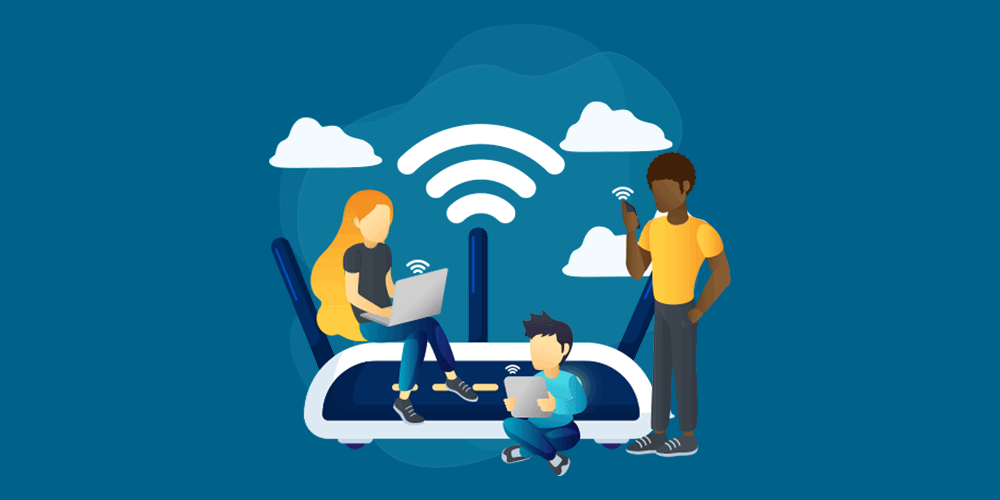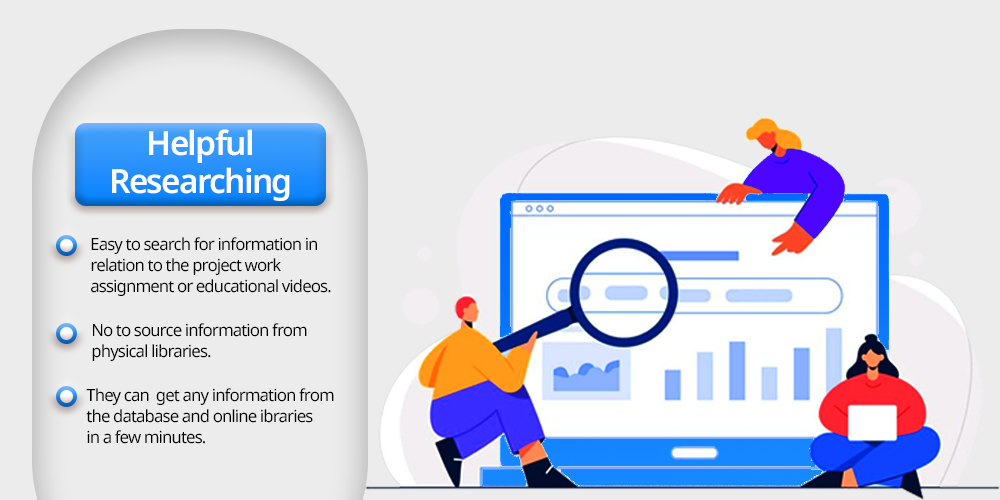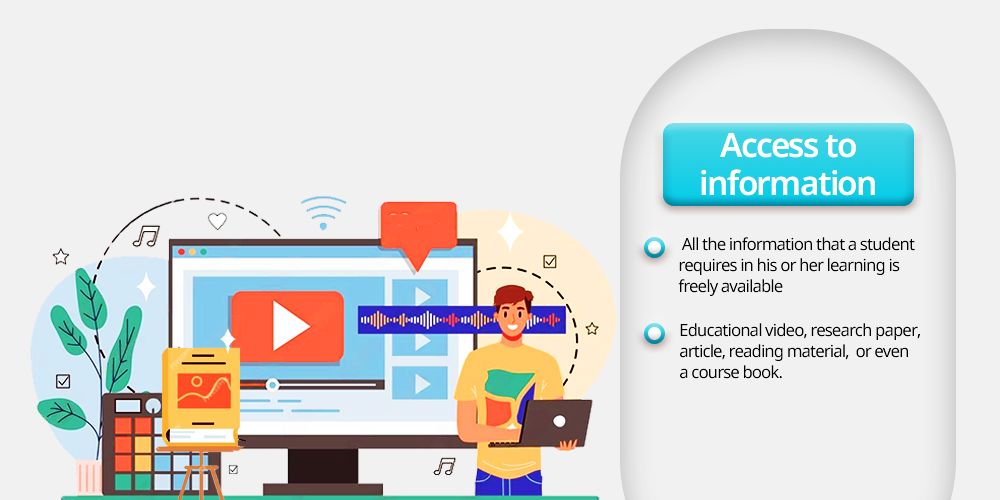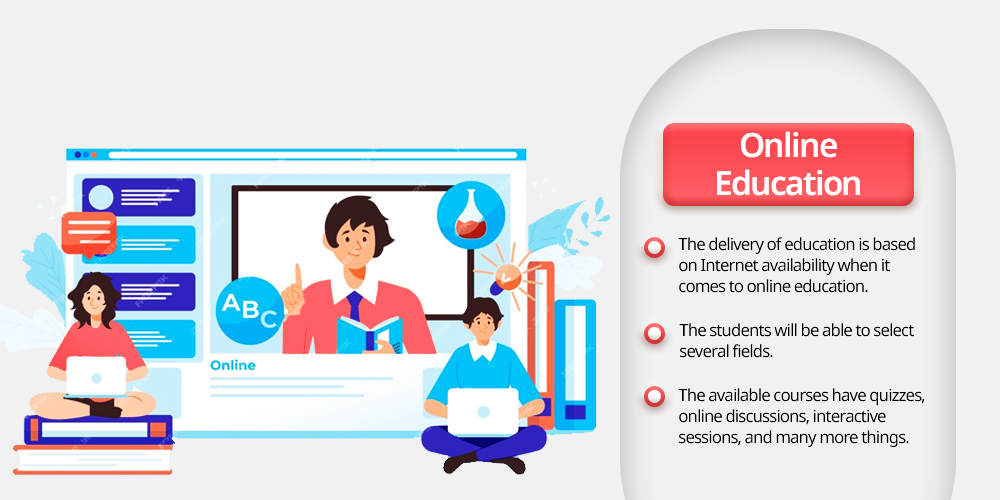
Nowadays one can not imagine their life without the internet. It has transformed the world, and revolutionised many sectors and education is no exception.
It is an invaluable tool required in almost every aspect of our daily lives. Considering its benefits in a student’s life we can not appreciate enough that can be accessed through the internet.
It offers students a rich source of information, and learning resources in terms of online school, classes, reading texts, informative videos, and many others, which makes students reach beyond their classroom.
It plays the role of teacher or rather guide to the student offering them all the answers and even otherwise assisting the student with information in order to succeed in study or life.
Also, enables the students to relate with their counterparts globally which can help them in developing friendships, and partnerships for research and other assignments, and have wonderful learning experiences.
In this blog, we will come across in detail the phenomenon of roles that the internet plays in a student’s life. Let’s have a look at a few important points as follows:
Contents
How the Internet is Beneficial for Student?
There are numerous advantages of the Internet that students can benefit from. Below we present some of the most highlighted advantages of the Internet for students-
1. Helpful Researching

Information regarding anything you may come across in your mind can easily be obtained from the internet. This makes it easy to search for information in relation to the project work assignment or educational videos in case of preparing yourself for exams effectively .
The modern smart AI in education for instance begins recommending more information related to what you are searching for. It is helpful when drawing information about your topic when studying your material, and when comprehending it thoroughly.
Through the internet, information delay has been minimised to the barest minimum of time as compared to the past. It has facilitated research in a way that cuts across the length of time usually taken traditionally.
Read, also Digital Classrooms: An Insight into the Future of Education to how digital things are reshaping the education system.
Researchers no longer have to worry about sourcing information from physical libraries; instead they can easily get any information they want from the database and online libraries in a few minutes.
Secondary sources research can also be conducted using particular search engines found on the internet such as Google Scholar or PubMed in case of pursuit of a particular subject or topic. It also allows one to engage in surveys, give out opinions and get in touch with people in their line of study.
2. Access to information

It would not be an exaggeration to say that virtually all the information that a student requires in the process of his or her learning is freely available through the World Wide Web.
It offers all forms of information in different areas whether it is an educational video, research paper, article, reading material, educational video, or even a course book. It also supports individual learning because through the internet all learners are compelled to look for information on their own.
The fact that any topic of discussion is usually accompanied by videos means that the students now even have a feel of the topic and understand the topic as well. Some of the learning platforms are Khan Academy, Duolingo, and Byjus and through such platforms, the student can get information in any form.
Also, read Benefits for teachers in Online Schools to know how they can help you in this modern way of education .
3. Communication

The advancement has probably facilitated communication. This was for example helpful during the Covid lockdown where the students had little to no physical contact with their teachers and therefore had to use the internet through various apps to communicate.
The ones used in this class include WhatsApp, Google Meet, Zoom, Skype, and many others are all accessible through the Internet. By sharing information with nearly everybody a student creates good relations with them and also gets information about their culture & community and the opportunities emerging in every nook and corner of the world.
Now, it is quite blended with the teamwork model of learning due to the availability of the internet facility. The students are able to work on a Group assignment with students from different parts of the world, share ideas, get real-time feedback, share attachments, and engage in relevant discussion that will help with their academic outcomes.
Have a look at How to Survive Group Projects in an Online Class? To know more about teamwork and group projects
4. Online Education

The delivery of education is based on Internet availability when it comes to online education. The students will be able to select several fields and also they will be in a position to cultivate several skills.
Unlike traditional education, online education is also considerably cheap. As a result, many students living in such areas have an easy and proper way to education and learning of preferred skills through the Internet.
The available courses have quizzes, online discussions, interactive sessions, and many more enabling it in a way to offer a similar environment to the traditional classroom where students speak, share their opinions, and listen to other students as well.
To all, the internet is open knowledge, therefore, this entity fully supports education for all notions.
5. Job Opportunities

Just as there are different visions of jobs, there should be a vision of the best online search platform to be thought about, and here that platform is LinkedIn. Some students of the university who are going to finish the period of study can register and get some information about several positions.
They can turn on the internet to interview for jobs or can dare take the opportunity they have. It has effectively expunged the cost of transportation and accommodation.
As for the filters the AI applied in numerous applications and websites recommends relevant positions for the applicants as well as recommend necessary courses which will help enhance the candidate’s CV.
There are platforms like Intershala that offer low-cost internships available for one to make himself a target for any choice of internships and training to be offered. These qualifications they get through online learning give them credibility and visibility.
6. Flexibility and Convenience
The internet helps in providing flexible learning opportunities to students, which allows them to learn from anywhere at any time.
This flexibility enables students to adapt their educational experiences to their own schedules. It allows them to accommodate other responsibilities such as jobs, family or extracurricular activities.
With the flexibility and convenience, students can study at their own pace, which creates a more personalised learning environment. The internet helps in providing online courses and resources from any location, irrespective of any challenges.
7. Skill Development
The internet allows students to indulge in online learning platforms , which allow students to improve their technical skills, including digital literacy skills and software applications. The self-paced online learning develops time management skills and problem-solving techniques.
Additionally, the internet provides collaborative tools and platforms that promote online group project, which improves their communication and teamwork abilities, which is essential for both academic and professional contexts.
8. Global Exposure
The internet serves as a gateway to a global community, allowing students to connect with peers, teachers and experts from a range of cultures and backgrounds.
By exposing students to a variety of perspectives, the educational process is improved and they are able to engage in discussions about global issues and practices.
Through group projects, webinars and online forums, students can learn about various cultural viewpoints, broadening their perspective and preparing them for a globalised workforce.
9. Cost Savings
The Internet implements online education, enabling students to study from their own homes, which helps in reducing costs and expenses. As in online learning, students don’t have to spend any money on physical books, housing rent, transportation, meals, etc.
Even with the help of the internet, students can access any information free of cost, which reduces their expenses on physical books and notes. This allows students to save their money, which they can use in other educational resources.
10. Learning Resources
The Internet provides online learning resources, including articles, videos and interactive simulations that cater to different learning styles and offer a multitude of data for research and analysis.
Students can access a wide range of resources that improve their comprehension of difficult subjects such as interactive simulations, articles, instructional videos and online courses.
Importance of Internet for Students
The Internet plays a vital role in our daily life, especially for children. Through the internet, students can study at their own pace, which enhances their learning outcomes and enhances their digital literacy skills.
Through the internet, students can connect globally and develop collaborative skills internationally. The Internet allows students to actively participate in the teaching and learning process through e-learning platforms, which use virtual learning platforms . Here is the importance of the Internet for students.
1. Digital Literacy Skills
The use of the internet helps in enhancing digital literacy skills among students. Students need to have internet access in order to develop digital literacy skills which can help them navigate online platforms, assess information and use a variety of digital tools.
This skill is essential in today’s technologically advanced world for both academic success and future employment readiness.
2. Modernizing Education
The internet has completely modernised the traditional education system by providing access to a wide range of resources such as e-books, online courses and instructional videos.
Equal accessibility allows for personalised learning experiences where students can engage with a range of resources and learn at their own pace; it fosters innovative teaching methods and allows for active participation.
3. Global Collaboration
The Internet helps in promoting global collaboration, which makes it easier for students from different locations to collaborate with others irrespective of any geographical boundaries.
Through the internet, students can develop their interpersonal skills and cultural awareness by working together on projects, exchanging ideas and learning about different viewpoints globally.
4. Efficiency in Homework
The Internet simplifies the homework process for students by providing instant access to information that enables efficient research.
Students who use online time and task management tools are more organized and productive, which eventually improves students academic performance . This allows students to easily complete their studies, which helps in reducing their study stress and preparing for examinations.
5. Games and Activities
The Internet makes learning fun with a variety of interactive activities and educational games. These materials include gamification components to inspire students and enhance student engagement.
They also offer chances for knowledge to be applied practically which improves critical thinking skills and problem-solving skills. Children like games and activities, which enhance their learning outcomes.
Uses of the Internet for Students
The Internet is very useful for every individual, especially for children, as with the help of the Internet, students can access a wide range of information from any location.
The Internet also makes education more accessible, through which students of every background can study without any hindrances.
1. Online Courses and Tutorials
The Internet has changed the traditional schooling method through online tutorials and courses.
With the help of digital platforms such as Coursera, edX, Khan Academy and so on students can access a wide range of courses in a variety of subjects from internationally recognized institutions and experts.
These online courses offer a thorough educational experience by frequently incorporating interactive tests, video lectures and discussion boards.
2. Enhance Learning Experience
The Internet helps in enhancing the learning experience of students through multimedia resources such as interactive simulations, podcasts and videos that cater to different learning preferences and styles.
These interactive sessions make education more enjoyable and impactful. Students can also interact with peers and teachers via online discussion boards and collaborative tools which fosters community and idea sharing.
3. Career Opportunities
Through the internet, students can have access to a wide range of career options. Students can look for internships, part-time, jobs and full-time positions that fit their interests and skill set using online job portals such as Indeed, Apna, LinkedIn, etc.
Furthermore, a lot of online programs and certifications are made to meet industry standards, giving students useful skills that improve their employability.
4. Wider Access to Education
The Internet provides wider access to education to every student from a range of backgrounds, including those who reside in remote or underserved areas.
With the help of the internet, more and more people can pursue their academic goals by bridging the gap between different socioeconomic groups. Students can also access resources in multiple languages through the internet, catering to a diverse range of learning and promoting inclusivity in the classroom.
5. Global Networking
Through the internet, students can engage with peers, educators and professionals around the world, facilitating global networking. Group projects and online discussion boards on social media platforms allow students to engage with a range of ideas and points of view.
A sense of global citizenship is fostered and cultural awareness is enhanced by this exposure to diverse cultures and viewpoints.
Conclusion
All things considered, everything indicates that the Internet is an essential tool for students. It has helped to place information right in the hands of a user from any province of the world.
The Internet has made five things in people’s lives fast and easy to accomplish, making learning a fast and hassle-free undertaking, making research a fast and easy process to start, and making advanced communication and collaboration in education .
That changes education not only for the learners in need of the matter but also for anyone learning in that setting. Thus using the opportunity offered by the internet people can master any skill that is ever in demand at any time.
The Internet has also contributed to the advancement of any employee’s career through opportunity provisions and self-enhancement resources.
As time goes on, the advancement in technology and the role of the internet in education is also set to advance and help students with opportunities and different platforms where they can facilitate their learning and career.
